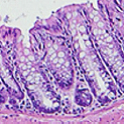 Inflammatory bowel disease (IBD) is a chronic inflammatory condition of the gut that causes pain and diarrhea. The most common forms of IBD are Crohn’s disease and ulcerative colitis. In the majority of patients these conditions can be well-controlled with medication, but surgery is sometimes required if treatment is not
Inflammatory bowel disease (IBD) is a chronic inflammatory condition of the gut that causes pain and diarrhea. The most common forms of IBD are Crohn’s disease and ulcerative colitis. In the majority of patients these conditions can be well-controlled with medication, but surgery is sometimes required if treatment is not effective. Given the rising incidence of IBD worldwide, there is a pressing need to develop new therapies for those who do not respond to current treatments. Many experimental treatments, from parasitic worms to cell therapy, are being investigated as new strategies to treat IBD, and it remains to be seen whether they will translate into effective therapies.
effective. Given the rising incidence of IBD worldwide, there is a pressing need to develop new therapies for those who do not respond to current treatments. Many experimental treatments, from parasitic worms to cell therapy, are being investigated as new strategies to treat IBD, and it remains to be seen whether they will translate into effective therapies.
New research published in BMC Medicine by Amarjargal Dashdorj and colleagues has investigated the antioxidant MitoQ as a potential treatment for IBD in a mouse model. Reactive oxygen species (ROS) are known to be involved in many inflammatory conditions, including IBD, and the authors hypothesized that inhibiting ROS would reduce the symptoms of IBD. Dashdorj and colleagues verified that IBD patients have elevated levels of ROS, and found that MitoQ ameliorates IBD in mice. Although the dextran sodium sulfate (DSS) colitis mouse model used by the authors has some limitations (particularly that it is thought to better represent acute gastrointestinal injury rather than chronic inflammation), no mouse model can replicate human IBD with complete accuracy, and further testing of MitoQ will be necessary before it can be used to treat patients.
 However, the results of this study are very promising; the authors demonstrate the therapeutic potential of MitoQ to treat IBD for the first time, through both its antioxidant and anti-inflammatory properties. MitoQ has been used to treat patients with liver damage in a phase II clinical trial with no major adverse effects, indicating that it is likely to be safe in IBD patients. Following the results of the study by Dashdorj and colleagues, we look forward to the results of additional investigations into MitoQ as a potential therapy for IBD, and hope to see the development of novel IBD treatments in the near future.
However, the results of this study are very promising; the authors demonstrate the therapeutic potential of MitoQ to treat IBD for the first time, through both its antioxidant and anti-inflammatory properties. MitoQ has been used to treat patients with liver damage in a phase II clinical trial with no major adverse effects, indicating that it is likely to be safe in IBD patients. Following the results of the study by Dashdorj and colleagues, we look forward to the results of additional investigations into MitoQ as a potential therapy for IBD, and hope to see the development of novel IBD treatments in the near future.
Comments